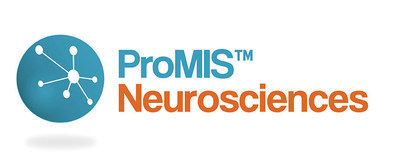ProMIS Neurosciences Lead Product Candidate for Alzheimer's Disease Shows Potential for Improved Therapeutic Potency versus Other Amyloid Beta-Directed Antibodies
Humanized PMN310 Shows Significantly Greater Binding to The Toxic Oligomer Fraction of Alzheimer's Disease Brain Extract Compared to Aducanumab
TORONTO and CAMBRIDGE, MA, Jan. 23, 2018 /PRNewswire/ - ProMIS Neurosciences, Inc., a biotechnology company focused on the discovery and development of precision treatments for neurodegenerative diseases, today announced further results of its previously announced and ongoing preclinical program for Alzheimer's disease (AD). ProMIS is pleased to announce that its lead product candidate for AD, PMN310, compared to aducanumab (Biogen) showed significantly greater binding to the neurotoxic oligomer-enriched fraction of amyloid beta (Aβ) in brain extract from eight confirmed AD brains.

Commenting on these results, ProMIS Executive Chairman, Eugene Williams, stated: "We set out to design an improved antibody inspired by the initial successful clinical results of aducanumab announced in Dec 2014. We recently reported greater selectivity of PMN310 for Aβ oligomers in direct comparison to other amyloid beta-directed antibodies, including aducanumab. ProMIS also recently announced that PMN310 shows a lack of binding to plaque in and around blood vessels in the brain, thereby supporting the potential for lower risk of brain swelling and possibility of higher dosing with PMN310."
Williams continued, "We are pleased to announce further results supportive of a best in class profile for our lead AD program. In comparison to aducanumab, humanized PMN310 showed significantly greater binding to brain material from AD patients containing toxic Aβ oligomers, the root cause of disease. Affinity maturation of PMN310 is ongoing and may result in an even greater advantage with PMN310; we look forward to sharing these results in the coming months."
Recent reports from the scientific literature1-5 indicate that small, low molecular weight Aβ oligomers, consisting of twelve strands of Aβ (dodecamers), four strands (tetramers) or two strands (dimers) of Aβ are the toxic oligomer form. To test the binding to these toxic oligomers by PMN310 and other Aβ-directed antibodies, ProMIS isolated the soluble low molecular weight (LMW) fraction of brain material from eight AD brains expected to contain dodecamers, tetramers and dimers. Binding by aducanumab, bapineuzumab and humanized PMN310 to the toxic oligomer fraction from these brains was assessed by surface plasmon resonance (SPR). The results showed greater binding of aducanumab to the toxic oligomer LMW fraction compared to bapineuzumab, in line with the greater therapeutic benefit of aducanumab. Importantly, PMN310 showed even greater binding (~1.5-2 fold) compared to aducanumab. The ability to selectively target LMW toxic Aβ oligomers without binding Aβ monomers (reduced efficacy) or plaque (increased risk of brain swelling, also called ARIA-E) is expected to allow for safe administration of higher effective doses and greater therapeutic potency.
SPR is a highly sensitive technique to detect binding interactions. In the SPR study outlined above, the test antibody therapeutics (bapineuzumab, aducanumab and humanized PMN310) were each immobilized on an SPR sensor chip. The AD brain extract containing the LMW toxic oligomers was then flowed over each of the chips and the amount of toxic oligomer extract bound by the test antibodies was measured.
Additional information can be found in the latest company slide presentation at www.promisneurosciences.com
References
- Shankar, GM et al (2008) Amyloid-β protein dimers isolated directly from Alzheimer's brains impair synaptic plasticity and memory. Nat Med 14: 837-842
- Jin, M et al (2011) Soluble amyloid β-protein dimers isolated from Alzheimer cortex directly induce Tau hyperphosphorylation and neuritic degeneration. PNAS 108: 5819-5834
- Cleary, JP et al (2005) Natural oligomers of the amyloid-β protein specifically disrupt cognitive function. Nature Neuroscience 8: 79-84
- Yang, T et al (2017) Large soluble oligomers of amyloid β-protein from Alzheimer brain are far less neuroactive than the smaller oligomers to which they dissociate. J Neurosc 37: 152-163
- Lesne, SE et al (2013) Brain amyloid-β oligomers in ageing and Alzheimer's disease. Brain 136: 1383-1398.
About ProMIS Neurosciences, Inc.
ProMIS Neurosciences is a development stage biotechnology company focused on discovering and developing precision medicine therapeutics to treat neurodegenerative diseases, in particular Alzheimer's disease (AD) and amyotrophic lateral sclerosis (ALS). The Company's proprietary target discovery engine is based on the use of two complementary techniques. The Company applies its thermodynamic, computational discovery platform—ProMIS™ and Collective Coordinates — to predict novel targets known as Disease Specific Epitopes (DSEs) on the molecular surface of misfolded proteins. Using this unique precision medicine approach, the Company is developing novel antibody therapeutics and specific companion diagnostics for AD and ALS. ProMIS is headquartered in Toronto, Ontario, with offices in Cambridge, Massachusetts. ProMIS is listed on the Toronto Stock Exchange under the symbol PMN.TO, and on the OTCQB Venture Market under the symbol ARFXF.
For further information please consult the Company's website at: www.promisneurosciences.com
Follow us on Twitter
Like us on LinkedIn
Neither the TSX nor its Regulation Services Provider (as that term is defined in the policies of the TSX) accepts responsibility for the adequacy or accuracy of this release. This news release contains certain "forward-looking statements" within the meaning of Canadian securities legislation. Forward-looking statements are statements that are not historical facts; they are generally, but not always, identified by the words "expects", "plans", "anticipates", believes", "intends", "estimates", "projects", "aims", "potential", "goal", "objective", "prospective", and similar expressions, or that events or conditions "will", "would", "may", "can", "could" or "should" occur. Forward-looking statements are based on the beliefs, estimates and opinions of the Company's management on the date the statements are made and they involve a number of risks and uncertainties. Consequently, there can be no assurances that such statements will prove to be accurate and actual results and future events could differ materially from those anticipated in such statements. Except as required by the securities disclosure laws and regulations applicable to the Company, the Company undertakes no obligation to update these forward-looking statements if management's beliefs, estimates or opinions, or other factors, should change.
SOURCE ProMIS Neurosciences Inc.
Released January 23, 2018